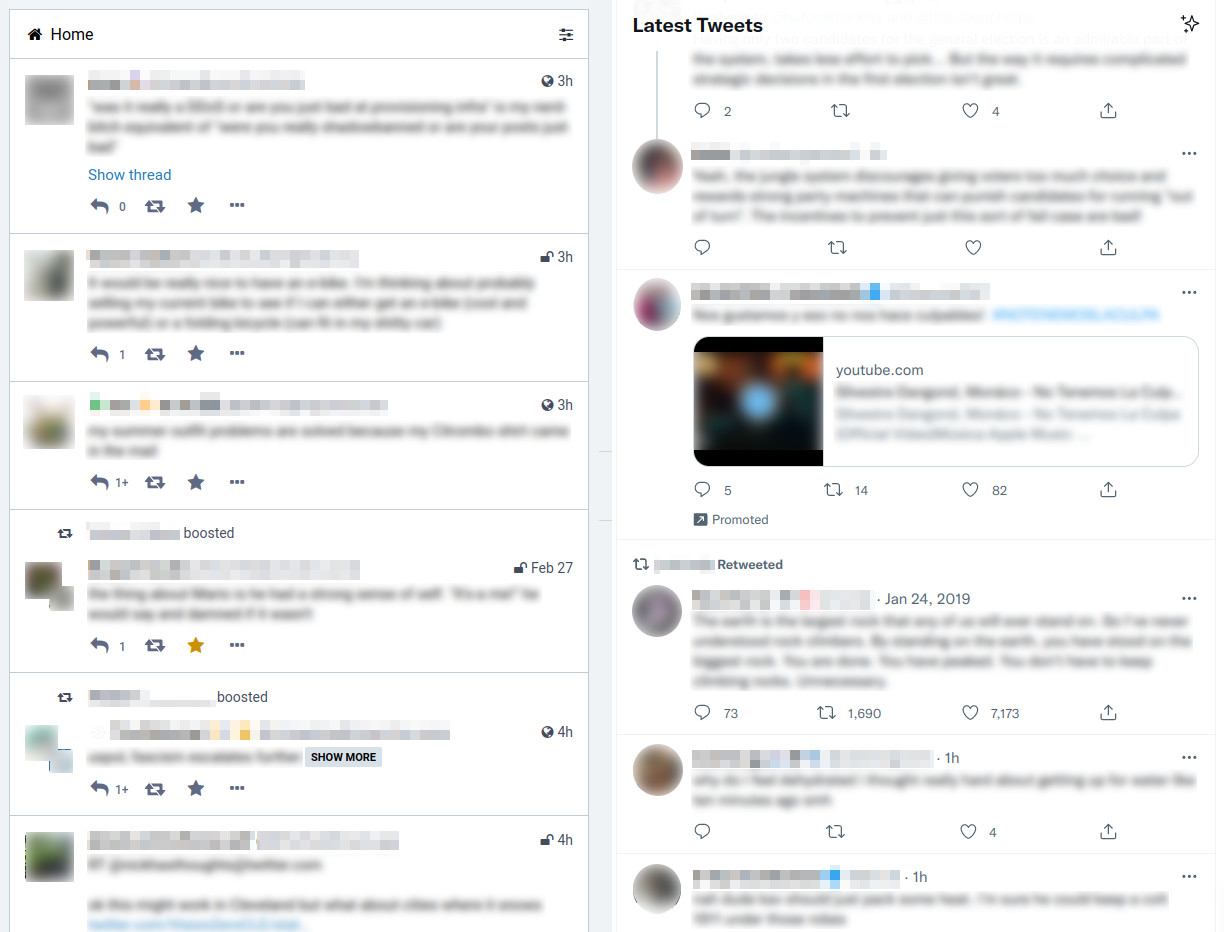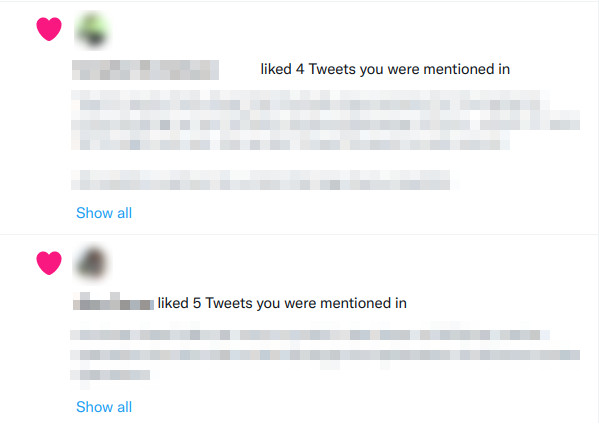4 Twitter features Mastodon is better for not having
October 29, 2022
Now that a billionaire troll bought Twitter and will likely make it Nazi-friendly (or otherwise ruin it), many people are checking out Mastodon, an open-source social network that can’t be controlled by any one organization. Here’s my account.
At first Mastodon looks like a straight-up clone. It meets Twitter’s 280-character Tweets with 500-character Toots. On Twitter you can Like, or Retweet to your followers; on Mastodon you can Favorite, or Boost to your followers. So far, so familiar.
But after some time on the network (I joined when the Musk purchase was first discussed in April), I’ve noticed subtle, welcome differences in how conversations play out. And some of the improvements come not from cool new Mastodon-specific features, but from Twitter features that are deliberately missing. The first of these happy omissions is right on the home timeline. Compare, Mastodon versus Twitter:

Notice the difference? In Mastodon’s home timeline, at left, posts don’t have metrics next to them. If you want to see how many boosts and faves a post got, you can, but you have to click through to that post.1
This simple change makes you judge a post first by its content, rather than the score attached to it. A tweet with few likes is suspect; one with tons of likes and retweets seems authoritative, or at least clever. And if you get more replies than likes, you’ve been “ratioed,” a Twitter concept that suggests you should feel embarrassed for making a stupid, unpopular post. While it can be satisfying to “ratio” a jerk, a bigot, or an out of touch pundit or politician, it also drives more attention to their content. And mobilizing lots of accounts into a pile-on is no guarantee of moral right: Sometimes the bullies ratio you. On Mastodon, this whole dynamic doesn’t exist.
Conversations, too, hide favorite counts, until you click on each individual post in turn. This leads to more thoughtful engagement rather than the temptation to go through a conversation Liking every post by the person who’s on “your side” to make it appear they won the argument.
On that note, the second happy omission I’ve noticed is notifications when someone Likes a reply to you:

If you’ve gotten in an intense argument on Twitter, you might dread this “So-and-so liked 10 Tweets you’re mentioned in” notification. It tends to mean someone went through and gave kudos to every person arguing with and insulting you. It’s stressful to be pinged over and over with this—which is exactly why we’re all tempted to do this to people we think crossed a line. In doing so, we, again, increase the reach of content we dislike.
The third Twitter feature Mastodon is better for not having is quote tweets. As Mastodon’s lead developer Eugen Rochko explained it:
I’ve made a deliberate choice against a quoting feature because it inevitably adds toxicity to people’s behaviours. You are tempted to quote when you should be replying, and so you speak at your audience instead of with the person you are talking to. It becomes performative. Even when doing it for “good” like ridiculing awful comments, you are giving awful comments more eyeballs that way.
Now if you’re skeptical of this one, so was I. Not every quote tweet is a dunk! Some are adding context in a friendly way. I thought Eugen was throwing out the baby with the bathwater.
It took time to unlearn my habits and realize it was, in fact, a blessing that Mastodon’s design was steering me towards talking to people rather than pointing at them. When you quote, you branch the conversation to talk about someone, and it’s not always clear if the original poster is welcome to participate in the new branch. You’re more likely to exchange ideas and learn something by replying.
As an alternative, you can boost your reply to someone. Or, of course, you can copy a toot’s URL and link to it, or screenshot it. But this adds enough friction to avoid becoming the default interaction mode. As Elilla, the author of a helpful Mastodon introduction, puts it, “In twitter most of my feed was quote-retweets snarkily dissing on things I hate, thereby exposing me to them; in masto most of my feed is people giving one another emotional support.”
The fourth Twitter feature I’m glad Mastodon doesn’t have is full-text search. You can search by hashtag. And on some servers, you can do a full-text search of toots that you wrote, boosted, or favorited.2 But you can’t do a full-text search of the entire Mastodon network.
Why is this good? Because other people can’t do full-text searches of the Mastodon network, find your posts, and harass you. The infamous practice of name-searching—finding tweets about you even if the person didn’t tag you, and then confronting those people—goes away. You don’t have to write “El*n” to hide from the Elon Musk fanboys. (When you do want people to find your topical posts, use #hashtags.)
Like not supporting quote toots, this is not a technical limitation; it’s a deliberate, thoughtful decision by the Mastodon project.
Conclusion: nonprofit social media enables healthier design
Back in April, when the news first broke of Elon buying it, I took a one-week break from Twitter, only using Mastodon. My main concern was a social network that couldn’t be bought. Thanks to its decentralized design, no one person or organization will ever control the fediverse, the umbrella term for Mastodon’s social network. And that was all I thought I wanted: a decentralized Twitter clone.
By the end of that week, my perspective had changed. I had unlearned patterns of communication Twitter taught me. Returning to Twitter, I was shocked by the rudeness and hostility. Since then, I’ve tried to lower the temperature of disagreements and remind myself like counts don’t prove who is right or wrong. I’ve tried to use Twitter more collaboratively. But Twitter’s affordances work against that.
I don’t think it’s a coincidence that an open-source, community-controlled version of social media fosters healthier discourse. The lack of profit motive enables thoughtful design. Mastodon isn’t under pressure to post high user engagement numbers to justify investment.
Look back at the four missing features I named: metrics in timelines, notifications of likes of your replies, quote tweets, and full-text search without the opt-in mechanism of hashtags. Every one of those features would juice engagement numbers in the short term. Hostile interactions make us want to defend ourselves and hit back. Conflict is good from the perspective of a growth-centered platform, even as it leaves us all drained and exhausted.
If Mastodon were only a Twitter clone Elon Musk couldn’t buy, that would be worth a lot. It’s also free of ads and tracking—that’s a bonus. But it turns out to be more profound than even that. David Graeber wrote that “the ultimate, hidden truth of the world is that it is something that we make, and could just as easily make differently.” Moving to Mastodon is a simple everyday way to make our world differently.
-
There is a reply count, but it only ever says 0, 1, or 1+. That’s to encourage you to check the replies in case someone already said what you want to say. Also, the number of favorites only counts users on your same server who favorited the post, so it may seem low. The boost count is network-wide. ↩
-
This targeted version of full-text search, I find, is way more useful than Twitter’s indiscriminate version. My current server, social.coop, has this limited full-text search feature turned on. Mastodon.online, which I was on previously, appeared to have it disabled and could only search for hashtags and accounts. ↩
